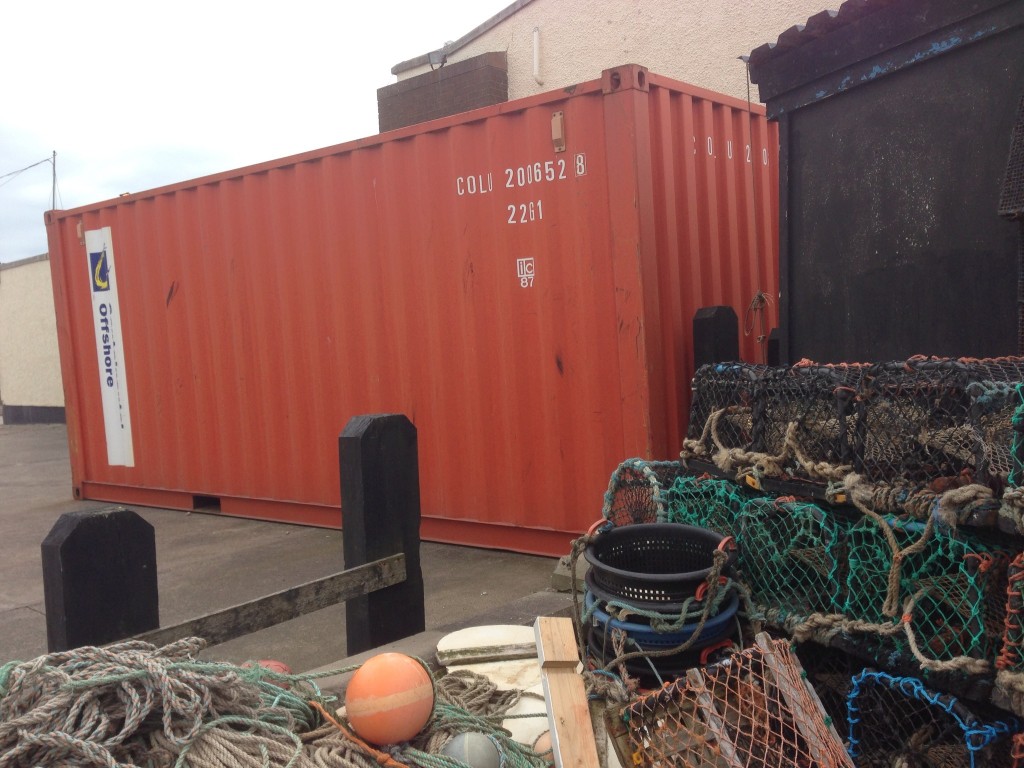We just spent a few days in Scotland and spotted this shipping container being used for storage at the harbour in Stonehaven, Aberdeenshire.

Storage container in Stonehaven
Meanwhile, news of the BBC News container: it’s now in its 3rd year of post-shipping existence as a soup kitchen in Kleinvei, South Africa. According to Tim Smith of Breadline Africa: “The Children’s World Kitchen project has benefited enormously when they received this container. It is three years since this container was received and began serving the need of the community.”

The post-shipping BBC Box in the Cape Flats
My containers correspondent, Captain Thomas Marnane, followed up our previous discussion about the importance of standardisation in shipping with some observations on the environmental benefits of containers – not a standard angle on the globalisation of trade, it must be said. In an email he wrote:
“The conservation of resources by reducing container weight and saving fuel (hauling on land and at sea), increasing cargo weight available, reducing losses, etc. is an example of what I call “closet environmentalism”. It is not all altruistic. That is that, in general, I believe environmental improvements and resource conservation is most brought about by individuals and businesses who have incentives to improve by using and wasting fewer resources to provide a product or service and improve either quality of life and/or the bottom line, and for the most part they do it without fanfare or publicity.”
We should add the recycling of containers to other uses as part of his environmental tally.
This whole discussion was of course set off by the container that appeared in my local park, and [amazon_link id=”0691136408″ target=”_blank” ]The Box[/amazon_link] by Marc Levinson.
[amazon_image id=”0691136408″ link=”true” target=”_blank” size=”medium” ]The Box: How the Shipping Container Made the World Smaller and the World Economy Bigger (New in Paper)[/amazon_image]

I’m not won over by Captain Thomas Marnane’s term ‘closet environmentalism’. The ‘closet’ part is, presumably, borrowed from the gay lexicon. It implies something that is done secretively, but also deliberately or with intention (whether that deliberateness is because of choice, inclination or pre-determined nature is, of course, a matter of much debate and contention). Generally speaking, the term closet in the gay lexicon carries connotations or either guilt, fear, or guilty or willful pleasure.
To say that the conservation of resources through containerisation is ‘not all altruistic is true – but I suggest that to also classify it as ‘closet’ environmentalism is a misapplication of the term. Any environmental benefits are purely happenstance and certainly not part of a deliberative mode; at the very least there are indeed not a standard angle on the globalisation of trade. It certainly is not done deliberately in secret because of associated guilt, fear or guilty or willful pleasure.
I suggest that rather than ‘closet’, more plain and conventional terms would be better suited to describe the resultant environmental benefits of containerisation – perhaps, ‘accidental’ or ‘incidental’… or even ‘happenstance’.
I think your presumption is incorrect. The meaning is the obvious one, hidden from plain sight.
Sophistry, oxymoron or what?
Don’t know what you mean.
Some words have accumulated a palimpsest of meanings over the generations.
This is an interesting follow-up link on ‘container urbanism’: http://places.designobserver.com/feature/the-emergence-of-container-urbanism/37672/
Pingback: Shipping news | The Enlightened Economist